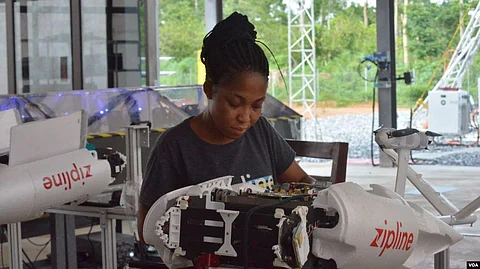Zipline flight operator Josephine Fianu gets a drone ready for takeoff from the Omenako drone center. So far, four health centers are using the service in Ghana. (S. Knott/VOA)
The drones fly autonomously, can carry 1.8 kilos of cargo, can cruise at 110 kilometers an hour and have an all-weather round-trip range of 160 kilometers. They look like small propeller planes. A drone will zoom above the hospital, release its package attached to a red parachute, then zip back to the base without landing at the hospital.
The launch in Ghana marked Zipline's expansion in Africa. It started operating in Rwanda in October 2016 and now delivers more than 65 percent of Rwanda's blood supply outside the capital, Kigali. The service helped transform the country's medical supply chain.
Rainy season ahead
Ghana's services are still in the early stages, with only four health facilities using it so far. The Omenako center's fulfillment operations coordinator, Samuel Akuffo, said the service would prove its worth as Ghana starts to see heavy rain for the rainy season. The drones can fly in all weather conditions, and over roads that vehicles might not be able to pass in heavy rain.
ALSO READ: Kenya Upholds Laws that Criminalize Same-Sex Relations
"During this rainy season some of the roads to some of the health centers are very bad," Akuffo said. "When some of the roads get very muddy and very difficult to ply, most of the facilities find it difficult having to go and look for a particular medication or blood. … It also makes it difficult for their supplies to reach them, so most of the supplies are either postponed or they don't even go and get the product at all." (VOA)


